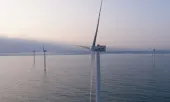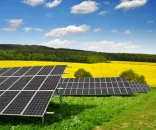The future of Singapore's renewable energy
By Anton FinenkoAround the world, governments are stepping up efforts to grow their renewable energy capabilities in order to address climate change and reduce reliance on fossil fuels.
For the small city-state of Singapore which has no significant indigenous energy resources of its own and is consequently dependent on fossil fuel imports to meet its energy needs, the use of various forms of renewable energy could improve the country’s energy diversity and security, as well as reduce its dependence on fossil fuels.
However, due to geographic constraints, like the lack of space and the absence of strong winds or marine currents, Singapore has very limited potential to deploy any renewable energy resources, apart from solar photovoltaics, biomass, and waste-for-energy combustion.
In addition to the unfavorable natural conditions there is a range of regulatory, technical, and commercial issues which make the harnessing of alternative energy in Singapore difficult.
Despite these challenges, according to a new white paper launched by industry experts in January 2014, renewable energy could meet about 8 percent of Singapore's current peak power demand by 2025. The paper notes that solar, biomass, and biogas power generation is already viable in Singapore.
The levelised costs of these forms of power generation have already fallen below the retail tariffs and continue to decrease in line with the falling systems costs. Therefore, even without any state subsidies, such as the feed-in-tariff for green power, it is possible to use cost-competitive alternatives to carbon-intensive fossil fuels.
There is also a potential investment of S$3 billion to S$4 billion from the private sector waiting to flow into the renewable energy sector, claim the experts.
Nonetheless, the road to renewable energy integration is paved with many obstacles that need to be removed in order to unlock the potentials outlined in the White Paper.
According to the experts, the main difficulty is the restrictions on individuals or companies to sell excess renewable energy to the power grid and to reap profits from it.
Furthermore, the domestic operator of the wholesale electricity market at present has no trading mechanism that allows for the ready sale of the renewable energy.
The intermittent nature of solar energy is both a technical and policy challenge in any country. When the sun is covered by passing clouds, the panels are idle and the grid system has to deal with a sudden gap in supply.
There is also the issue of associated reserve costs which need to be reallocated if solar energy comes into the market. The problem of intermittency can be slightly alleviated by distributing solar panels across the larger areas.
The White Paper contends that revisions must be made to the municipal waste collection and sorting practices if the full potentials of biomass- and biogas-fired power generation are to be realised.
The document will be shared with the Energy Market Authority of Singapore, which came up with its own consultation paper last October discussing some of the same topics.
To date, the power sector already has about 30% excess fossil-fired generation capacity and government has not yet set any renewable energy targets specifying the proportion of electricity that should be generated by renewable sources within any time period.
The public is eagerly waiting for the government to begin announcing such targets soon.














 Advertise
Advertise











